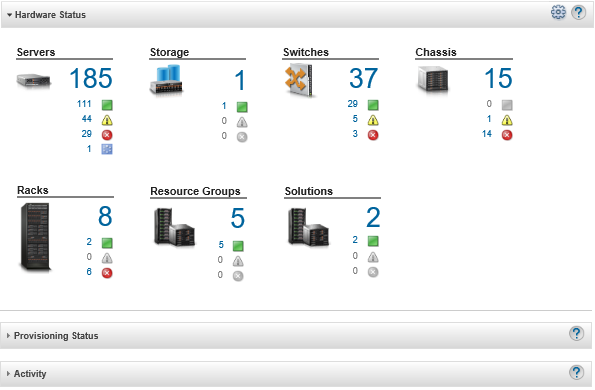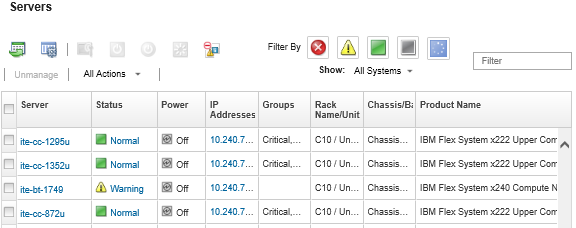Viewing the status of a managed server
You can view a summary and detailed status for the managed servers and their installed components from the Lenovo XClarity Administrator.
About this task
(Untrusted)is appended to the status of each applicable device, for example Warning (Untrusted). If there is a connectivity issue or a connection to the device is not trusted,
(Connectivity)is appended to the status of each applicable device, for example Warning (Connectivity).
(
 ) Critical
) Critical(
 ) Warning
) Warning(
 ) Pending
) Pending(
 ) Informational
) Informational(
 ) Normal
) Normal(
 ) Offline
) Offline(
 ) Unknown
) Unknown
On
Off
Shutting down
Standby
Hibernate
Unknown
Procedure
To view the status for a managed server, complete one or more of the following actions.
From the XClarity Administrator menu bar, click . The dashboard page is displayed with an overview and status of all managed devices and other resources.

From the XClarity Administrator menu bar, click . The Servers page is displayed with a tabular view of all managed servers (rack and tower servers, and compute nodes).
You can sort the table columns to make it easier to find specific servers. In addition, you can select a system type from the All Systems drop-down list, enter text (such as a name or IP address) in the Filter field, and click the status icons to list only those servers that meet the selected criteria.
 From this page, you can perform the following actions:
From this page, you can perform the following actions:- View detailed information about the server and its components (see Viewing the details of a managed server).
- View a server in graphical rack or chassis view clicking or .
- Launch the management controller web interface for the server by clicking the IP address link (see Launching the management controller interface for a server).
- Remotely manage the server (see Using remote control to manage Converged, Flex System, NeXtScale, and System x servers).
- Power the server on and off (see Powering on and off a server).
- Modify system information by selecting a server and clicking .
- Refresh inventory by selecting a server and clicking .
- Export detailed information about one or more servers to a single CSV or JSON file by selecting the servers and clicking .NoteYou can export inventory data for a maximum of 60 devices at one time.TipWhen importing a CSV file into Microsoft Excel, Excel treats text values that contain only numbers as numeric values (for example, for UUIDs). Format each cell as text to correct this error.
- Unmanage a server (see Unmanaging a rack or tower server).
Reset the local storage adapters to their default manufacturing settings by clicking .
- Change the Location LED state on a server to on, off, or blinking by selecting the server and clicking , selecting the state, and clicking Apply.
Toggling the Location LED for ThinkSystem SR635 and SR655 servers is not supported.
The Location LED on ThinkServer servers can be on or off. Blinking is not supported.
- Virtually reseat the server (see Virtually reseating a server in a Flex System chassis).
- Exclude events that are of no interest to you from all pages on which events are displayed by clicking the Exclude events icon (
 ) (see Excluding events).
) (see Excluding events). Restart the server using a non-maskable interrupt (NMI) by clicking .
- Enable or disable firewall rule changes on a server that limit incoming requests only from XClarity Administrator by selecting the server and clicking or .
The global encapsulation setting is disabled by default. When disabled, the device encapsulation mode is set to
normal
and the firewall rules are not changed as part of the management process.When the global encapsulation setting is enabled and the device supports encapsulation, XClarity Administrator communicates with the device during the management process to change the device encapsulation mode to
encapsulationLite
and to change the firewall rules on the device to limit incoming requests to those only from XClarity Administrator.AttentionIf encapsulation is enabled andXClarity Administrator becomes unavailable before a device is unmanaged, necessary steps must be taken to disable encapsulation to establish communication with the device. For recovery procedures, see lenovoMgrAlert.mib file and Recovering management with a CMM after a management server failure. - (Converged, Flex System, NeXtScale, System x, and ThinkSystem servers only) Resolve issues that might arise between the XClarity Administrator security certificate and the security certificate of the baseboard management controller in the server by selecting a server and clicking (see Resolving an untrusted server certificate).
Resolve expired or invalid stored credentials for a device in the group (see Resolving expired or invalid stored credentials for a server).
Add or remove a server from a static resource group by clicking or .